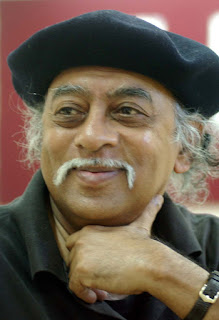 Brief introduction: A versatile genius who was known for his flair and magic with words, born on September 17, 1938, the legend Dilip Chitre was the Indian critic and poet who wrote Father Returning Home. The poem speaks about the loneliness and the sheer alienation the poet's father's experiencing at one point in his life where he cease to find time and an opportunity to matter to his children, who no longer share anything with him. He himself is estranged from the man-made world. Hence, throughout this poem Chitre has denounced the urban rootlessness and alienation.
Brief introduction: A versatile genius who was known for his flair and magic with words, born on September 17, 1938, the legend Dilip Chitre was the Indian critic and poet who wrote Father Returning Home. The poem speaks about the loneliness and the sheer alienation the poet's father's experiencing at one point in his life where he cease to find time and an opportunity to matter to his children, who no longer share anything with him. He himself is estranged from the man-made world. Hence, throughout this poem Chitre has denounced the urban rootlessness and alienation.FLIRT CONCEPT:
F: 2 stanzas, each stanza consists of 12 lines
L: the languages used were- 1. SIMILE
2. COLOURFUL ADJECTIVES
I: The poet uses some fine imagery in the poem to describe the loneliness in his father's soul as he travels in local train. To convey the twilight atmosphere, Chitre has used short descriptive words in the poem.
R: a,b,c,d,e,f,b,a,g,h,a,i,j,k,l,m,n,o,p,q,r,r,s
T: alienation or estranged experience of an old man during the twilight years
1st STANZA:
- In the first stanza of Father Returning Home, it mostly describes the journey of the author's father while returning home one evening. It seems that the father is in a pathetic condition, looking drastic and disturbing in his muddy clothes. Whilst due to old age, the poet's father is having difficulty moving about because of his poor eyesight. This stanza portrays the the monotonousness of the old man, who sustains the weather as well as the estrangement from the man- made.
2nd STANZA:
- In the second stanza of Father Returning Home, the author represents more of the remoteness of his father that he experiences in his own dwelling. From the phrase "drinking weak tea, eating stale chapati" shows that the basic and daily requirements carried out by the father is not properly taken care off by family, yet again implying his father's loneliness. Going to the toilet and contemplating displays that the man is obviously upset with his predicament and is terribly shaken by the whole situation as he trembles while he washes his hands. As he is about to sleep, he realizes he's all alone and tries to compensate their company by listening to the radio and tries to interact with his ancestors in his dreams. It seems to be a relief to him from his mundane routine to devoid any human contact, while he tries to find joy for himself.
- The overall literary content of the whole poem is Chitre's use of wonderful imagery to describe the pathos of an old man and using unique similes to create an evocative image of an old man- depicting the monotonousness and meaningless in the old man's life. The imagery of the dream has been used to show the connection the author's father has with his past and his future. In the phrase "dreaming of his ancestors and grandchildren" it signifies that he is having difficulty in expressing his feelings that he has suppressed in himself for years.

